1,071 news posts

Featured news
10 Feb 2023
Kelly Thompson – Bringing sex and gender differences to the forefront
By Katharina StockDr Kelly Thompson is the Director of Research Operations at the Nepean Blue Mountains Local Health District in Western Sydney and an active researcher at The George Institute for Global Health. Having led the Global Women’s Health program at The George Institute as Program Manager, Kelly has more than five years of experience overseeing research on the health of women across the lifespan. Her personal research looks at critical infections and sepsis through an epidemiological lens with a focus on health equity and women’s health. Kelly and I discuss the role of reporting on sex and gender differences in disease, the importance of language when talking about these differences, and what is needed to achieve the United Nations Sustainable Development Goal 5.Kelly is currently serving as Associate Editor for Frontiers in Global Women’s Health. Photo credit: The George Institute for Global Health What made you want to pursue public health research, particularly focusing on health equity? “I started in clinical nursing in intensive care and loved it. Clinical nursing felt like a bit of a calling to me because of the focus on helping people, though eventually I wanted to have an impact on a larger scale. Fundamentally, […]

Featured news
10 Feb 2023
Five articles you need to check out on the future of astronomy and astrophysics
By Deborah Pirchner, Frontiers science writer Image: Shutterstock.com From uncovering the long-standing mysteries in extra-galactic astrophysics to understanding the properties of the sun’s outer atmosphere, astronomy research aims to help us understand what surrounds us. Frontiers highlights some of the top astronomy articles we have published recently. In a field as vast as space itself, cutting-edge work may be concerned with particles so small they are invisible to the human eye. Similarly, discoveries may be about whole galaxies. Those new findings, as well as advances in the theory, experiment, and methodology enable us to gain a better understanding of outer space. These five articles published recently as part of the Frontiers research topic ‘Horizons in Astronomy and Astrophysics’ cover important topics at the forefront of astronomy. Some Notes About the Current Researches on the Physics of Relativistic Jets Relativistic jets are powerful plasma jets emitted at the speed of light by black holes of some galaxies, massive stars, and neutron stars. In a review article published in Frontiers in Astronomy and Space Sciences, Italian researchers provided an effective critical review about one of the most long-standing mysteries in extra-galactic astrophysics: the origin of these ejections from the centers of galaxies. […]

Frontiers news
09 Feb 2023
Inspiring the next generation in STEM, Frontiers sponsors Potenti’elle en Science event
Research publisher Frontiers is a participating sponsor of the Potenti’elle en Science event taking place on 9 February 2023 in Lausanne, Switzerland. Hosted by the Suisse Romande chapter of the Healthcare Businesswomen’s Association (HBA), the event celebrates the annual International Day of Women and Girls in Science. It is designed to inspire young girls to learn more about careers in science, technology, engineering, and math (STEM). Photo credit: Frontiers Now in its third year, Potenti’elle en Science will be held for the first time as a hybrid, bilingual event in both English and French. During the three-hour event, students ranging from 8 to 18 years old will hear from keynote speakers and participate in dedicated workshops for each age group led by women currently working in STEM fields. Included among the fields represented are pharmaceutical and biotechnology, academia, and non-government organizations (NGOs). Time is also allotted for the students to engage with role models from STEM disciplines to learn more about their diverse academic and professional experiences. Frontiers has sponsored the Potenti’elle en Science event since the beginning. Cultural stereotypes and societal conditioning impact young women’s future aspirations, often influencing their field of study and ultimately affecting their career path. According […]

Frontiers news
09 Feb 2023
Frontiers announces new partnership agreement with FIIBAP
Spanish funding body Foundation for Biosanitary Research and Innovation in Primary Care (FIIBAP) has entered into a new partnership agreement with gold open access publisher Frontiers. The agreement, which was finalized in December 2022, supports FIIBAP’s mission to promote research and innovation in the field of primary healthcare. Grantees supported by the Foundation will have their open access publishing charges covered under the terms of the partnership and will also benefit from engagement with global level experts as part of Frontiers’ collaborative review process. Jaime Barrio Cortes, clinician and researcher at FIIBAP said: “we are very happy to enter into this agreement with Frontiers. We recognize the opportunities that it will open up for our grantees, as well enabling our foundation to align with Horizon requirements.” This new partnership further cements the Spanish research community’s commitment to open access and builds on existing agreements between Frontiers and other recent partners in Spain, including Consortium of Catalan University Services (Consorci de Serveis Universitaris de Catalunya, CSUC), University of León and the Spanish National Research Council (Consejo Superior de Investigaciones Científicas, CSIC). Ronald Buitenhuis, head of institutional partnerships at Frontiers said: “we are delighted to welcome FIIBAP into this new partnership. […]
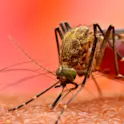
Engineering
09 Feb 2023
Human test subjects may no longer be needed for mosquito bite trials thanks to invention of new biomaterial
by Angharad Brewer Gillham, Frontiers science writer Image/Shutterstock.com Studies on mosquito feeding behavior are crucial to fighting malaria, dengue, and other mosquito-borne pathogens – but traditionally, they require humans or animals to act as meals for the mosquitoes. Scientists have developed a biomaterial which mimics skin, right down to blood under the surface, to make studies on mosquito feeding easier to run. Mosquitoes: the world’s deadliest animal. These tiny flying insects are vectors for dengue fever, yellow fever, Zika, malaria, and many other illnesses which affect millions of people around the world, with a significant morbidity and mortality burden. Because they spread disease when they bite people, understanding their feeding behavior is critical to reducing the harm they do. But how to study mosquito feeding behavior without giving them a live meal? A collaboration between Rice University and Tulane University in the US has developed a biomaterial which could eliminate the need for human volunteers or animal subjects in mosquito bite research. “Several groups are dedicated to finding ways to stop mosquitoes from biting, but bringing new repellents to market is challenging,” said Prof Omid Veiseh, Rice University, corresponding author of the study published in Frontiers in Bioengineering and Biotechnology. […]
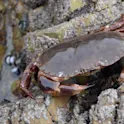
Featured news
07 Feb 2023
Proof that Neanderthals ate crabs is another ‘nail in the coffin’ for primitive cave dweller stereotypes
by Angharad Brewer Gillham, Frontiers science writer Image: Tomasz Ochocki/Shutterstock.com Scientists studying archaeological remains at Gruta da Figueira Brava, Portugal, discovered that Neanderthals were harvesting shellfish to eat – including brown crabs, where they preferred larger specimens and cooked them in fires. Archeologists say this disproves the idea that eating marine foods gave early modern humans’ brains the competitive advantage. In a cave just south of Lisbon, archeological deposits conceal a Paleolithic dinner menu. As well as stone tools and charcoal, the site of Gruta de Figueira Brava contains rich deposits of shells and bones with much to tell us about the Neanderthals that lived there – especially about their meals. A study published in Frontiers in Environmental Archaeology shows that 90,000 years ago, these Neanderthals were cooking and eating crabs. “At the end of the Last Interglacial, Neanderthals regularly harvested large brown crabs,” said Dr Mariana Nabais of the Catalan Institute of Human Paleoecology and Social Evolution (IPHES-CERCA), lead author of the study. “They were taking them in pools of the nearby rocky coast, targeting adult animals with an average carapace width of 16cm. The animals were brought whole to the cave, where they were roasted on coals and […]
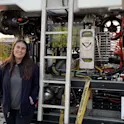
Featured news
06 Feb 2023
‘Many kids go through a phase where they want to be a marine scientist. For me, it wasn’t a phase’
by Patricia Albano/Angharad Brewer Gillham, Frontiers science writer Patricia stands with remotely operated vehicle Deep Discoverer aboard NOAA Ship Okeanos Explorer during an expedition to explore the deep waters off the West Florida Shelf. Image: Patricia Albano. Marine protected areas are meant to give threatened species space to live and thrive. But in a recent paper in Frontiers in Marine Science, Patricia Albano and colleagues showed that at least one protective area isn’t capturing the range that endangered sharks use as they grow, leaving them vulnerable to commercial fishing. Albano, now the Internship Program Coordinator at the National Marine Sanctuary Foundation, NOAA Ocean Exploration, caught up with Frontiers to tell us a little about her career and her research, as part of our Frontiers Scientist series. Albano’s work focuses on shark ecology in an anthropogenic world and the associated conservation implications. After a BA and MSc from the University of Miami, she joined a project evaluating the efficacy of the De Hoop marine protected area (MPA) for threatened and endemic sharks off South Africa. Albano also dedicates her time to working in ocean education, supporting workforce development programs and efforts to increase diversity, equity, inclusion, and accessibility. In 2020, she […]
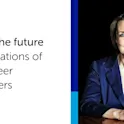
Open science policy
02 Feb 2023
Writing the future: The aspirations of early career researchers
Personal reflections on a symposium. On 9 January, Dr Anke Beck, head of European public affairs and advocacy at Frontiers, helped chair a symposium for early career researchers at the Association of Publishing in Europe annual conference. Photo credit: Frontiers There is a profound cultural change underway that will transform the way science is funded, shared, and published – and thereby the impact new knowledge has on society. Open Science, backed by broader calls for diversity and inclusion, is now a strong and growing focus for governments, funders, institutions, and authors. And of course, it is finding voice and resonance with early career researchers (ECRs), whose values and beliefs on inclusion, transparency, and trust will drive this scientific debate. In that context, at the start of the year I had the pleasure of helping to coordinate an intense and energizing symposium with ECRs. The Berlin Institute of Scholarly Publishing under the auspices of the 18th Academic Publishing Conference and the Quest Center for Responsible Research brought together researchers, publishers and platforms to listen, exchange views, and hack through new ideas, in person and online. Over forty-eight hours, with 105 participants across 10 time zones in Western and Eastern Europe, North America, […]

Featured news
01 Feb 2023
Medicines that modify the circadian clock might help heal scars more cleanly
by Angharad Brewer Gillham, Frontiers science writer Image/Shutterstock.com Scientists determined that compounds which play key roles in both collagen synthesis and circadian management can be used to make wounds on cell samples heal more quickly and effectively, offering promise for treatments to prevent problem scarring in the future. Healing often leaves a scar. But the role of the scar itself in healing is often underestimated: a scar that doesn’t heal cleanly can be painful or upsetting or affect the range of movement of the affected body part. It may even require further surgical treatment. Now, scientists based at the University of California Los Angeles have found that compounds which target the circadian clock and affect the synthesis of collagen — a protein which is important for skin repair — could improve scar healing. “Our aim was to find compounds that were able to increase the rate at which dermal wounds heal while mitigating the formation of hypertrophic scars,” said Dr Akishige Hokugo, corresponding author of a study published to Frontiers in Medicine. “Scars can result in emotional distress following normal wound healing by serving as permanent reminders of the initial incident. Accounting for additional revision procedures, extended hospital stays, and […]

Featured news
31 Jan 2023
Nobel Prize winners publish new scientific articles just for kids
Latest Nobel Collection articles offer fresh excitement to young scientists Photo credit: Frontiers Frontiers for Young Minds, a unique, completely free kids’ science journal launched its second Nobel Collection today. It features five new articles in which top scientists connected directly with young reviewers to ensure their articles are clear, educational, and fascinating to read for young people before they were published in the journal. This is the second volume within the Nobel Collection, with articles written by Nobel Laureates and reviewed by children aged 8 to 15. It promises to be an exciting and educational experience for both kids and adults alike. Volume 1, which is complete, already showcases 10 amazing Nobel Prize-winning authors, writing about their world-changing discoveries in fields from neuroscience to crystallography, from computer simulations to behavioral economics. This time, highly valued Nobelists provide insights and inspiration from their amazing work on the following topics: The Olfactory System: It Smells Good to Be Alive, written by Richard Axel, awarded the Nobel Prize in Physiology or Medicine in 2004. How many odors (smells) in the world around you do you think you can recognize? In this article, find out how your brain recognizes different odors and […]
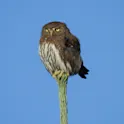
Featured news
31 Jan 2023
Songbird species work together to mob predator owls, but only strike when the time is right
By Mischa Dijkstra, Frontiers science writer Northern pygmy owl, Glaucidium gnoma. Image credit: W Douglas Robinson Scientists have now shown that songbirds don’t just flee from their predator, the northern pygmy owl: they sometimes actively seek them out to aggressively mob them. But the likelihood of mobbing wasn’t constant: it was highest during late summer and autumn when the owls mostly prey on young birds instead of mammals, and at low altitudes, where the owls are most common. The likelihood of mobbing also increased when there were more songbirds around to dilute the individual risk. The authors conclude that songbirds can tell when the risk of predation from northern pygmy owls is greatest, and mostly ignore these owls at other times of the year. Fleeing isn’t the only way by which songbirds can protect themselves against predators. Many songbird species are known to engage in mobbing, where they gather aggressively around a bird of prey, flying rapidly while making stereotypic movements and loud vocalizations. Mobbing is risky for both parties: birds of preys have been observed to attack their mobbers, while cases are known of birds of prey getting injured by mobbing songbirds. Read original article Download original article (pdf) […]

Health
30 Jan 2023
Five articles you need to check out on the future of surgery
By Colm Gorey, Science Communications Manager Image: Shutterstock.com From robotic surgeons to ultra-detailed imaging technology, the field of surgery is going through rapid change. To help us understand what the latest research is in this world of dissection, Frontiers highlights just some of the top articles we’ve recently published. The robot takeover of the workforce is nowhere more apparent than in the medical world, where many delicate surgical procedures are either aided by a robotic assistant, or in some cases performed entirely by a machine. But advances in surgery are not just limited to robotics, with new imaging technologies helping us peer inside the human body like never before. Here are five recent Frontiers articles published as part of the research topic ‘Anatomical Fundamentals of Advanced Surgical Techniques’ that may greatly influence even more breakthroughs in the future. Robotic pelvic exenteration for gynecologic malignancies, anatomic landmarks, and surgical steps: a systematic review Pelvic exenteration – a surgical operation to remove multiple organs in the pelvis – represents the last resort procedure for patients with advanced primary or recurrent gynecological malignancy, such as endometrial cancer. However, since 2009, the advent of robotic surgery resulted in a new spur to the […]
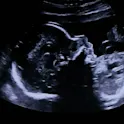
Featured news
30 Jan 2023
$1 smart glove could help prevent dangerous births by sensing fetal position
by Conn Hastings, science writer Image/Shutterstock.com Low-resource regions often lack the medical technology to assess when things are going wrong during birth. A new study has revealed an inexpensive sensing glove that can transmit data on fetal position and force applied to the fetal head. The technology could be invaluable in identifying obstructed birth in low-resource regions, providing real-time data on a smartphone app. Can inexpensive technologies provide a helping hand during birth? A new study in open-access journal Frontiers in Global Women’s Health has revealed a low-cost sensing glove that could do just that. The researchers created the device to assist healthcare staff in identifying fetal position and the force applied to the fetal head during labor, factors that can contribute to obstructed labor and poor birth outcomes. The technology can provide real-time data during vaginal examinations, potentially improving birth outcomes in low-resource regions. Birth outcomes in low-resource regions When labor is not going as it should, clinicians can use a wide array of medical technologies to determine what is wrong. However, in low- and middle-income countries, these technologies and skilled staff who can use them are not always available. The researchers behind this latest study reported that 98% […]
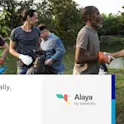
Featured news
25 Jan 2023
Frontiers’ Volunteers: Thinking globally, acting locally
The growth mindset guiding Frontiers to support solutions for healthy lives on a healthy planet once again came to life through our annual volunteer efforts. At Frontiers, we believe each of us plays an important role in having a positive impact on society. That is why we are committed to contributing to communities in a meaningful and sustainable way. We encourage our people – affectionately referred to as Frontons – to participate in volunteering activities with charity partners. To make this possible, each Fronton receives three working days per year that they can dedicate to volunteer efforts. Photo credit: Frontiers Every Fronton is empowered to volunteer, and our volunteering platform Alaya makes it particularly convenient to get involved. Alaya compiles available opportunities with vetted organizations into a digital catalog, allowing Frontons to filter these based on a variety of criteria, including cause, skills, and location, in order find the right match. The platform also gives Frontons a space to connect over these volunteering activities and encourages further participation, be it individual outputs or group initiatives. Over the past year, Frontons spent 662 hours, or the equivalent of 27.5 days, volunteering, donated 241 goods, and raised CHF 625 in monetary donations. Their […]

Featured news
25 Jan 2023
Using running to escape everyday stresses may lead to exercise dependence instead of mental wellbeing
By Angharad Brewer Gillham, Frontiers science writer Image/Shutterstock.com Different kinds of escapism can motivate people to take part in running, but using running to escape from negative experiences rather than using it to escape to positive ones may lead to exercise dependence. Recreational running offers a lot of physical and mental health benefits – but some people can develop exercise dependence, a form of addiction to physical activity which can cause health issues. Shockingly, signs of exercise dependence are common even in recreational runners. A study published in Frontiers in Psychology investigated whether the concept of escapism can help us understand the relationship between running, wellbeing, and exercise dependence. “Escapism is an everyday phenomenon among humans, but little is known regarding its motivational underpinnings, how it affects experiences, and the psychological outcomes from it,” said Dr Frode Stenseng of the Norwegian University of Science and Technology, lead author of the paper. Running to explore or to evade? “Escapism is often defined as ‘an activity, a form of entertainment, etc. that helps you avoid or forget unpleasant or boring things’. In other words, many of our everyday activities may be interpreted as escapism,” said Stenseng. “The psychological reward from escapism is […]